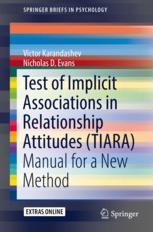

Most ebook files are in PDF format, so you can easily read them using various software such as Foxit Reader or directly on the Google Chrome browser.
Some ebook files are released by publishers in other formats such as .awz, .mobi, .epub, .fb2, etc. You may need to install specific software to read these formats on mobile/PC, such as Calibre.
Please read the tutorial at this link: https://ebookbell.com/faq
We offer FREE conversion to the popular formats you request; however, this may take some time. Therefore, right after payment, please email us, and we will try to provide the service as quickly as possible.
For some exceptional file formats or broken links (if any), please refrain from opening any disputes. Instead, email us first, and we will try to assist within a maximum of 6 hours.
EbookBell Team

5.0
28 reviewsThis volume presents a manual for a new method of studying implicit attitudes, the Test of Implicit Associations in Relationship Attitudes (TIARA). The main goal of this volume is to demonstrate how to study the implicit attitudes that people have toward others in their close relationships: friend, romantic partner, family member, etc. Since the inception of the concept and measures of implicit cognition, researchers have developed a number of indirect measures to assess implicit attitudes. These similar yet different methods aim to account for different variables for reliable and valid operational definitions of implicit attitudes. Given the progress made in the field of implicit measures, there is great potential for further development and extension of these types of assessments. Many of these methods (especially the Implicit Attitude Test) are only limited to assessing attitudes within the comparison of two bipolar concepts. Therefore, TIARA was developed to be a manual for a new method of studying implicit attitudes in relationships.
As described in this volume, TIARA shows that if a person strongly believes that certain feelings can be attributed to a target relationship figure, the reaction time is shorter since they are the most confident in their answer. Beginning with a grounded explanation of the theory behind TIARA, the volume then proceeds to explain its methods and procedures, and how to code, score, and interpret the results of TIARA. Next, the volume reports on six psychometric studies, which provide substantial evidence that TIARA is a valid and reliable measure to study implicit attitudes in relationship research. The volume concludes by exploring practical applications of TIARA as well as its future directions and current limitations. The detailed description of the TIARA method provides a practical and handy tutorial for using the method in research and practice for social and personality psychologists, as well as practitioners.